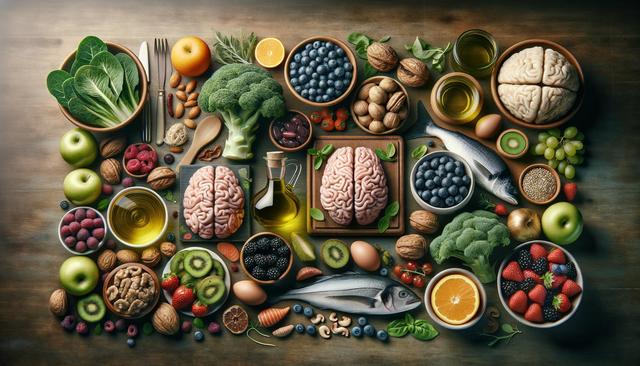Understanding the Link Between Diet and Brain Health
As research into dementia progresses, one area gaining attention is the role of nutrition in brain function. What we eat doesn’t just fuel our bodies—it also provides essential nutrients that protect the brain from age-related decline. While there’s no single food that can prevent dementia entirely, adopting a nutrient-rich diet can support cognitive health and potentially reduce risk factors associated with memory loss and neurodegenerative conditions.
Scientific studies have linked diets like the Mediterranean and DASH (Dietary Approaches to Stop Hypertension) to improved brain health. These diets emphasize whole foods, healthy fats, and reduced intake of processed products. They are rich in antioxidants, healthy fats, vitamins, and minerals—all of which play a role in preserving brain function. The idea is that by reducing inflammation and oxidative stress, these diets can help maintain neural connections and slow down cognitive aging.
Incorporating brain-supporting foods into daily meals is a proactive way to support long-term mental clarity. This approach not only contributes to better health outcomes but also encourages mindful eating habits that can benefit overall well-being.
Leafy Greens and Cruciferous Vegetables
Vegetables, particularly dark leafy greens and cruciferous varieties, are frequently recommended for their brain-boosting properties. Vegetables like spinach, kale, broccoli, and Brussels sprouts are packed with vitamins and antioxidants that support cognitive function. High in vitamin K, folate, and beta carotene, these vegetables help combat oxidative stress and inflammation, two key contributors to cognitive decline.
According to nutritional studies, individuals who consume more servings of leafy greens tend to show slower rates of cognitive deterioration. These vegetables are also a source of lutein, a carotenoid that has been linked to better brain function in older adults.
Here are some easy ways to include brain-friendly vegetables in your meals:
- Add spinach or kale to smoothies or omelets
- Roast Brussels sprouts or broccoli as a side dish
- Use leafy greens as a base for salads
Making vegetables a consistent part of your meals is a simple yet effective strategy to nourish your brain and promote mental sharpness over time.
Fatty Fish and Omega-3 Fatty Acids
Fatty fish such as salmon, sardines, and mackerel are among the most well-known sources of omega-3 fatty acids, which play a crucial role in brain health. Omega-3s, particularly DHA (docosahexaenoic acid), are essential for maintaining the structure of brain cells and facilitating communication between them. Regular consumption of these healthy fats has been associated with a reduced risk of cognitive decline and slower progression of dementia-related symptoms.
Incorporating fatty fish into your diet two to three times per week can contribute to better brain function. If fish isn’t a preferred option, there are alternative sources of omega-3s, including:
- Flaxseeds and chia seeds
- Walnuts
- Algae-based supplements (for vegetarians and vegans)
While omega-3 supplements are available, obtaining these nutrients through whole foods is generally recommended for overall health benefits. Beyond cognitive support, omega-3s also contribute to heart health, creating a comprehensive benefit for aging individuals.
Berries and Brain-Boosting Antioxidants
Berries such as blueberries, strawberries, and blackberries are rich in antioxidants, particularly flavonoids, which have been shown to delay brain aging and improve memory. These powerful compounds help reduce oxidative stress and inflammation, both of which can damage brain cells over time. Studies have found that regular consumption of berries may improve communication between brain cells and increase plasticity, aiding learning and memory.
Including berries in your diet can be as simple as adding them to your breakfast or enjoying them as a snack. Some practical ideas include:
- Mixing berries into yogurt or oatmeal
- Blending into smoothies
- Eating fresh or frozen berries on their own
Frequent consumption of berries has been associated with improved cognitive performance, particularly in older adults. Making them a staple in your diet could provide long-term benefits for brain health.
Nuts, Seeds, and Brain-Friendly Nutrients
Nuts and seeds are nutrient-dense foods that offer a variety of benefits for brain health. Rich in vitamin E, healthy fats, and antioxidants, these foods help protect brain cells from oxidative damage. Vitamin E, in particular, has been linked to slower cognitive decline in older adults. Popular varieties like almonds, walnuts, and sunflower seeds are not only convenient snacks but also effective additions to meals for added nutrition.
Walnuts are especially notable for their high content of omega-3 fatty acids, making them a plant-based alternative to fish. Seeds such as pumpkin and flaxseeds also contain important nutrients like magnesium and zinc, which contribute to brain function and mood regulation.
Ways to enjoy nuts and seeds include:
- Sprinkling them on salads or cereals
- Blending into smoothies or using as nut butters
- Snacking on mixed nuts in moderation
Including a variety of nuts and seeds in your diet supports not only cognitive health but also cardiovascular and metabolic wellness, which are intertwined with brain function.


